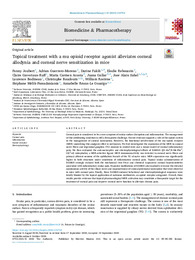Title:
Topical treatment with a mu opioid receptor agonist alleviates corneal allodynia and corneal nerve sensitization in mice |
Authors:
Joubert, Fanny
Guerro-Moreno, Adrian
Fakih, Darine
REBOUSSIN, Elodie 
Gaveriaux-Ruff, Claire
Acosta Boj, Maria Carmen
Gallar, Juana 
Sahel, José Alain
BODINEAU, Laurence 
Baudouin, Christophe 
Rostene, Willian
Mélik-Parsadaniantz, Stéphane
REAUX LE GOAZIGO, Annabelle  |
Editor:
Elsevier |
Department:
Departamentos de la UMH::Fisiología |
Issue Date:
2020-10-06 |
URI:
https://hdl.handle.net/11000/38114 |
Abstract:
Corneal pain is considered to be a core symptom of ocular surface disruption and inflammation. The management of this debilitating condition is still a therapeutic challenge. Recent evidence supports a role of the opioid system in the management of corneal nociception. However, the functional involvement of the mu opioid receptor (MOR) underlying this analgesic effect is not known. We first investigated the expression of the MOR in corneal
nerve fibers and trigeminal ganglion (TG) neurons in control mice and a mouse model of corneal inflammatory
pain. We then evaluated the anti-nociceptive and electrophysiological effects of DAMGO ([D-Ala2,N-Me-Phe4,
Gly5-ol] enkephalin), a MOR-selective ligand. MOR immunoreactivity was detected in corneal nerve fibers and
primary afferent neurons of the ophthalmic branch of the TG of naive mice. MOR expression was significantly
higher in both structures under conditions of inflammatory corneal pain. Topical ocular administration of
DAMGO strongly reduced both the mechanical (von Frey) and chemical (capsaicin) corneal hypersensitivity
associated with inflammatory ocular pain. Repeated instillations of DAMGO also markedly reversed the elevated spontaneous activity of the ciliary nerve and responsiveness of corneal polymodal nociceptors that were observed in mice with corneal pain. Finally, these DAMGO-induced behavioral and electrophysiological responses were totally blunted by the topical application of naloxone methiodide, an opioid receptor antagonist. Overall, these results provide evidence that topical pharmacological MOR activation may constitute a therapeutic target for the treatment of corneal pain and improve corneal nerve function to alleviate chronic pain.
|
Keywords/Subjects:
corneal pain
inflammation
opioid receptor
electrophysiology |
Type of document:
info:eu-repo/semantics/article |
Access rights:
info:eu-repo/semantics/openAccess
Attribution-NonCommercial-NoDerivatives 4.0 Internacional |
DOI:
10.1016/j.biopha.2020.110794 |
Published in:
Biomed Pharmacother . 2020 Dec:132:110794 |
Appears in Collections:
Artículos Fisiología
|

.png)
